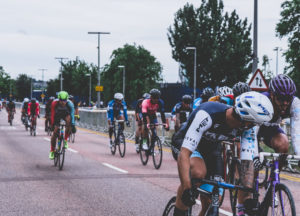 Distracted driving has become a big issue and with good reason. People think nothing of texting and talking while operating a 3-ton motor vehicle. No wonder it’s never been more dangerous to drive.
Distracted driving has become a big issue and with good reason. People think nothing of texting and talking while operating a 3-ton motor vehicle. No wonder it’s never been more dangerous to drive.
It’s symptomatic of our modern inability to focus, to remove clutter and distraction and live lean mentally.
Distracted driving is a subject for another time, however. Today’s topic is distracted cycling. At least 80 percent of cyclists I see on the roads here in Florida’s most densely populated county ride while listening to music. Bicycling is inherently dangerous, especially around here, but these folks think nothing of relinquishing arguably their second-most important sense. Thus they’re not able to hear cars approaching from behind, the sirens of emergency vehicles, or the voices of other cyclists. If a pedestrian wanted to shout a warning to them about oncoming danger, the cyclist likely would not hear it.
Not only that, by listening to music, the cyclist is losing focus. Instead of having all five senses on high alert to navigate this dangerous world, they’re lost in a cocoon of noise.
Distracted driving and distracted cycling is a dangerous mix, one I witnessed several weeks ago while in the car. The driver in front of me clearly was texting and the car was weaving in and out of the lane. Up ahead was a cyclist riding in the bike lane. A collision appeared likely. Thankfully the cyclist, who was not wearing a listening device, heard the car drifting into the bike lane and swerved into the shoulder, avoiding disaster. Thankfully there was a shoulder. The cyclist yelled some choice expletives, which the driver probably didn’t hear, focused as she was on the phone.
More often, however, the cyclist would have been wearing a listening device, oblivious to the car drifting over, and likely now injured or dead.
In theory, cycling is supposed to be healthy, saving us money and helping the environment. In reality, many use it as another form of digital distraction, creating a volatile mix on the roads.
If you don’t ride a bike regularly, perhaps you think this message doesn’t apply. But we’ve reached the point where many folks won’t do anything unless they’re tethered to a device or at least exposed to media. They’ve surrendered their ability to focus and operate in quiet, when the mind and senses arguably are most effective.
Many folks cannot disconnect, even when exercising, and not only is this dangerous for cyclists, it defeats the purpose of training outdoors. One of the great joys of cycling, running, hiking, or paddling is enjoying the outdoors with all five senses. If you’re plugged into music, you might as well be indoors on a treadmill or stationary bike.
Understandably, music is performance enhancing. Whatever your taste in tunes, a favorite playlist can ramp up your energy and produce a better workout. In the gym many people listen to their own music rather that endure the many commercials interspersed with the club’s music. Or they might prefer their own songs. All of which is understandable, though even that’s dangerous as wired people in the gym sometimes run into others or don’t hear equipment moving around them.
One of the most important rules at triathlons is to not wear listening devices – ever. Not on the swim, not on the bike, not on the run, not even while setting up in the transition area before the race. That’s because athletes need to hear emergency vehicles, other athletes passing them, and the announcements broadcast over the sound system in transition. It’s a matter of safety.
Roads generally are closed to traffic during triathlons. But nobody would think of riding with a listening device. (Actually, some athletes would, but it’s cause for immediate disqualification.) So why wear listening devices when roads are open? It actually might be less of a risk to ride with no helmet and no listening device than with a helmet and a listening device. Heck, it’s dangerous enough with a helmet and no listening device.
To live lean means maintaining focus. This increases productivity and forces you to eliminate the clutter of the mind, zeroing in on what’s important. It also means choosing the beautiful sounds of nature over digital distraction.
When it comes to cycling, the life you save could be your own.
